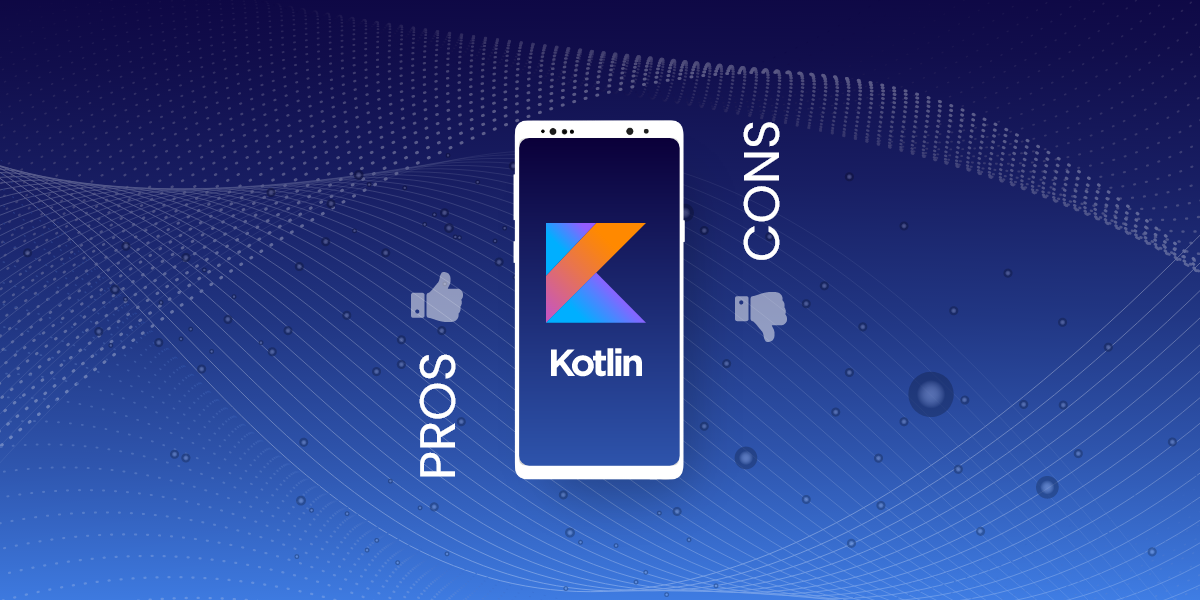Advantages and Disadvantages of Kotlin Programming Language
- Mobile
- September 30, 2019
In the year 2017, Google marked a new epoch in the swiftly evolving field of Android app development by announcing its support for Kotlin. This one is a statically-typed programming language, which runs on JVM aka Java Virtual Machine.
Developed by YouTrack, JetBrains, and numerous other IDE solutions, this open source language has created a buzz worldwide. Recently, JetBrains had claimed that Kotlin can spell impressive results in writing iOS apps as well. It supported Android, iOS, and several other browsers through its web apps.
Over the past few years, the overall popularity of Kotlin has reached another level altogether. With its rapidly growing supports for both the prime mobile platforms, Kotlin has earned a great deal of reverence across the globe. It is anticipated that the future of Kotlin will not be confined to Android applications only.
The arrival of Kotlin has also given rise to a bunch of queries. Where did it hail from? Should the already existing apps, which are written with the conventional stack, embrace this recently popularized programming language?
Wondering whether you should switch to Kotlin leaving the traditional options like Java or Android to be back-burnered? Steering clear of all these queries would be easier once you understand the pros and cons of using Kotlin.
But, before we proceed further to unearth the advantages and disadvantages of Kotlin, let’s give you a brief depiction of what Kotlin is. Have a look:
Kotlin and Some Important Facts Related to It
As mentioned earlier, Kotlin refers to a statically-typed programming language that can generate codes for running on Java virtual machines. Kotlin has obtained its name from the island of Kotlin, which is situated in Russia.

The syntax of Kotlin is incompatible with Java that is generally used for building apps for different Android platforms. But, surprisingly it is capable of interoperating with Java codes. In other words, codes written in Kotlin can work seamlessly with Java as it does natively.
Kotlin relies on an aggressive inference to decide the kind of expressions and values if these are not depicted properly. Owing to this feature, Kotlin has become more distinctive than Java that often needs repetitive type specifications.
Kotlin was invented in the year 2011. Even within this short span of time, Kotlin has stolen the limelight and turned into a reliable programming language for developing Android apps.
Thanks to the monumental popularity of Kotlin, some of the world’s leading tech organizations have started counting on it for developing Android apps.
Some of the Biggest Pros and Cons of Kotlin
Since the moment it came into being, Kotlin has garnered oodles of praises from the millennial mobile app developers.
According to some developers, this language is even better than its elder counterpart Java. However, this statement has got a mixed bag of reactions in return.
However, to get a quick overview of which one you should consider for your Android app development, explore our blog on Kotlin Vs Java.
It is not a cakewalk to judge whether or not Kotlin works better than Java. However, we are not looking to strike any comparison between these languages. Rather, we are intended to find out some of the biggest advantages and disadvantages of using Kotlin.
The Pros of Using Kotlin

1. It Maximizes the Productivity of Teams
Kotlin is a Java based programming language. It can eliminate the cumbersomeness as well as obsolescence of Java. Besides being a clear, compact and efficient language, Kotlin takes pride in owning an intuitive and concise syntax.
As a result, Kotlin has the capability to maximize the overall productivity of an entire development team at an Android app development company. It entails a very little time to write as well as deploy new codes using Kotlin. It also ensures easier code maintainability at scale.
2. It Coordinates with Existing Java Code
The programming language of Kotlin has interoperability in Java. It is consistent with Java and many other related frameworks and tools. This makes it possible for making a switch to Kotlin.
In case if your products can’t be written in just Kotlin, both the programming languages could be easily used simultaneously.
3. It Can be Maintained with Ease
Kotlin has stellar support for many IDEs that include Android studio and numerous other SDK tools.
This helps in maximizing the overall productivity of a developer because it can continuously deal with the toolkits they are already used to.
4. It is a Lot Less Buggy
With a clearer and more compact codebase, Kotlin leaves no rooms for making mistakes. It also provides more stable codes in production.
The compiler can identify every possible mistake at a compile time span sans any hassle. As a result of this, it turns Kotlin into a safer substitute to Java.
5. It is a Lot More Reliable
Unlike many other conventional programming languages, Kotlin is a lot more mature language. Kotlin came into being back in the year 2011.
From the moment it was introduced, Kotlin has undergone multiple Beta and Alfa stages prior to releasing its final version. The latest release is reversely compatible with its several other previous language versions.
6. It is Easy to Learn
Kotlin is aimed at enhancing the features of Java rather than just rewriting them. All the skills that a mobile app developer has mastered and obtained when working on Java, could be applied to every project related to Kotlin as well.
7. It Combines Functional and Procedural Programming
At present, there are a bunch of programming paradigms, which are in the widespread usage. Every programming paradigm owns its share of advantages and disadvantages.
So, when there is no dearth of the scenarios where the procedural programming has zero advantage, there could be a number of difficulties where the functional approach can be more effective.
In order to spell the finest results, Kotlin combines the best of the functional as well as procedural programming.
The Cons of Kotlin

1. It is Still Different from Java
Even though Kotlin and Java have a number of similarities to share, they have some prominent differences as well. The mobile app developers cannot make a switch to any other programming language sans learning thoroughly about Kotlin.
2. Slower Compilation Speed
In a few cases, Kotlin works faster than Java, especially while performing incremental builds. But it should be kept in mind that Java would still reign supreme when it is about clean building.
3. Fewer Kotlin Professionals to Recruit
Despite the sky high popularity of Kotlin, there are still only a handful of programmers available in this field today.
It is needless to say that every mobile app developer who wants to work on Kotlin should gain in-depth knowledge on it. Unfortunately, it is still difficult to find the truly experienced experts in the domain of Kotlin.
4. Limited Resources for Learning Kotlin
Even though, most of the developers are increasingly switching to Kotlin, there is a limited community of developers available worldwide. It leads to restricted resources for learning the programming language and resolving different queries in the process of app development.
So, What Lies in the Future?
For quite some time now, the field of mobile app development has been preoccupied with Kotlin.
However, this new age programming language is yet to be explored to the fullest. In fact, we have to wait for another couple of years to witness Kotlin to ascend to the crest of popularity.













